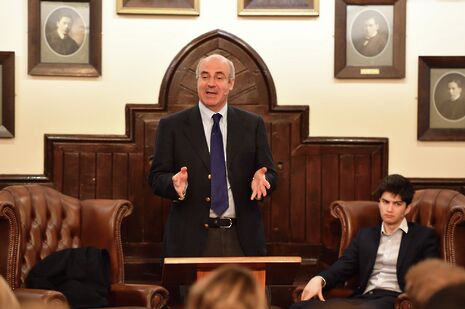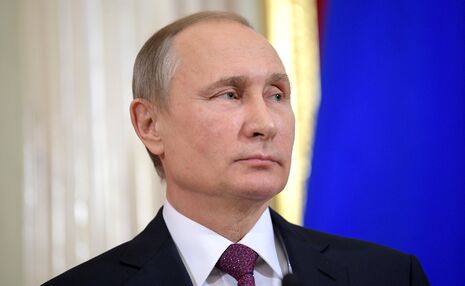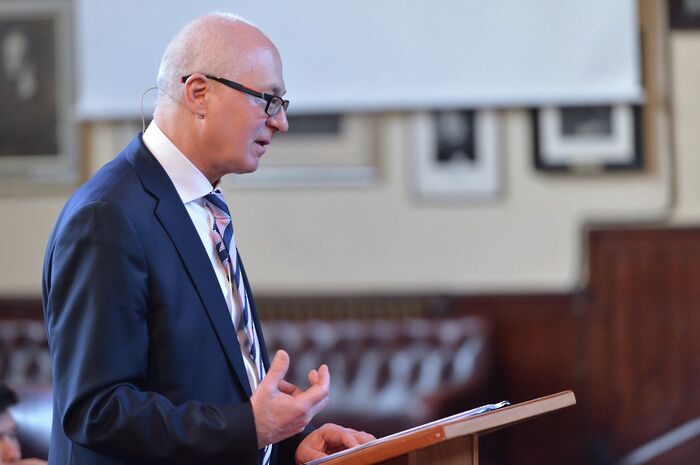Bill Browder, Putin’s ‘number one enemy’
Felix Peckham talks with the hedge fund manager turned human rights activist about the webs of money and power in Russian and American politics

Vladimir Putin’s unlikely ‘Number One Enemy’ is a bespectacled American man in his early fifties. He’s not a politician, diplomat or tyrant. No, he’s a disgruntled banker. Bill Browder, grandson of Earl Browder – the leader of the US Communist Party in the 1930s and 40s – was a US citizen until 1998, when he renounced his citizenship in favour of British citizenship, motivated partly by a desire to avoid paying US income tax on his foreign investments. He is best known, however, as the CEO of Hermitage Capital, a hedge fund that was once the largest foreign investor in Russia. It’s this job that generated his fascinating and murky story.
Browder is sincere and almost frosty in our exchange. What surprises me most, however, is how guarded Browder is on the topic of Russia, Trump and collusion. “I’m waiting to see the results of the Mueller investigation” is his deadpan response to my probe on Russia’s collusion in the 2016 election. “We just have to wait patiently and see whether there was [collusion].” For Putin’s ‘Number One Enemy’ this is startlingly non-committal, especially as the intricate and damning web of Trump’s involvement with Russia is being unwound.
“I’ve been threatened with death, kidnapping, extradition, arrest”
Despite his amiable comments on Russia’s subversion of American democracy, Browder is adamant in the defence of his ‘Number One Enemy’ title, it’s “just a factual description.” While this title – splashed on the front of his thriller-like book Red Notice: How I Became Putin’s No.1 Enemy – may have earned him book sales and kudos amongst Russophobes, it has come at a cost: “I’ve been threatened with death, kidnapping, extradition, arrest”. Browder explains he has a “very tenuous security situation compared to everybody else in the world”.
Putin has a brutal track-record in silencing his critics. Alexander Litvinenko, a former Russian secret service agent who defected to the UK, is testament to this. Litvinenko was poisoned in London by Russian agents in 2006, accused of being a traitor to his country. I ask Browder how his insecurity manifests itself, he recounts “on Monday this week, as I was leaving Switzerland my passport was flagged at the border by a Russian request and I was detained, asked a number of questions, with the information passed onto Russia”.
Browder’s story is one of two extremes. The first half of his book is essentially an account of his pursuit of ‘The American Dream’: a search for the seemingly unfettered riches that post-Soviet Russia offered. Browder was rewarded for his speed in taking advantage of the privatisation of Russian state industries – he has allegedly accrued a personal fortune of more than $4 billion. “If you stop reading halfway into the book you’d think of this as a kind of clever business story”, Browder explains, though in reality it’s “an inspiring justice story.”
“At this point everyone thinks of me as being a human rights activist”
“What I was doing was investing my time, resources, energies on trying to improve the corporate governance of Russian companies at a time when nobody else was doing that.” This is Browder’s attempt to defend his business and investments in Russia as an altruistic, albeit profitable, pursuit. The lucrative Russian venture came to an abrupt halt in 2005, when Browder was denied re-entry into Russia and accused of being a national security threat. It’s at this point that Browder undergoes a “transition from being a hedge fund manager to being a human rights activist”.
Aggrieved at the injustice of his denial of entry to Russia, Browder and Russian lawyer Sergei Magnitsky seek to reveal the corruption at the heart of Putin’s Russia. Something that stuck from reading Red Notice was how Browder seemed to be content to tolerate Russia’s human rights abuses and political corruption up until the point it jeopardized Browder’s money making scheme. Browder dismisses this interpretation: “I guess it depends on which part of the book you read last.” And tells me “at this point everyone thinks of me as being a human rights activist.”

When Magnitsky is tortured and killed in 2009, Browder champions legislation to prevent the Russian individuals involved in Magnitsky’s murder from being able to travel abroad and use the riches they had accrued through corruption: “I came up with a piece of legislation that affects Putin’s personal financial interests” to which Putin reacted by choosing “to chase [Browder] around the world with red notices and arrest warrants.”
Browder hits back against the “superficial interpretation” of his career that sees him as a disgruntled banker: “that would be the 30,000 foot impression”, he tells me. “I got to Russia, I discovered corruption in the companies I invested in. Unlike other Westerners who sat around and just waited for it to happen, I started to fight against it. I took great personal risk to try to stop kelptocracy from happening as an investor.”
“The reason why the Magnitsky Act happened was not because of the resources that I had”
Hermitage Capital, Browder’s Russia-specialising investment fund, saw a 2,697% rate of return between 1996 and 2007, and is said to control assets worth $400 billion. Given the extent to which money begets influence on Capitol Hill – where Browder was instrumental in lobbying for the Magnitsky Act, passed in 2012 – he is adamant that his personal wealth and financial capital had no impact on the success of the legislation. “The reason why the Magnitsky Act happened was not because of the resources that I had”, he says, though he admits that “there are many, many people who are coming to Washington with an issue. Rich people, poor people. Most people don’t succeed in getting their issue on the agenda.”
Instead, Browder ascribes his lobbying success to the fact that the story of Magnitsky was “so incredibly horrifying”. He tells me that “anyone who looked at the situation would have the same reaction, which was how can you allow an innocent man to be tortured and murdered.” This is a curious explanation for the successful passing of the Magnitsky Act, and I wonder how much the American people are concerned with the welfare of the citizens of a state on the other side of the world, and one which has traditionally been demonised and vilified in the United States.
Given the proximity of the recent attack on a school in Florida by a boy using an assault weapon, I ask Browder why the Magnitsky Act was successful while even moderate legislation to gun crime consistently fails. “There was no pro-Russian torture and murder lobby in Washington to fight against me and my compatriots”, Browder stutters in response.
“In the gun debate there’s an anti-gun lobby and there’s a pro-gun lobby and because of that it creates a different dynamic. It’s not about money. There are two different groups of people arguing against one another. In the Magnitsky story there’s nobody arguing against us.”
We segue into a comparison of corruption and kleptocracy in Moscow versus Washington. “I would say that there is absolutely no comparison between the United States and Russia. In the US you have an independent judiciary, a free press, and a democratic process to throw out corrupt politicians.” Browder assures me that “the Sergei Magnitsky story would have never happened in the United States, it’s a non-comparison to suggest that anything even comes close to the United States.”
 News / Cambridge academics sign open letter criticising research funding changes22 February 2026
News / Cambridge academics sign open letter criticising research funding changes22 February 2026 News / Supporters protest potential vet school closure22 February 2026
News / Supporters protest potential vet school closure22 February 2026 News / Student and union protesters hold ‘Trans Liberation Solidarity Rally’ 24 February 2026
News / Student and union protesters hold ‘Trans Liberation Solidarity Rally’ 24 February 2026 News / Union speakers condemn ‘hateful’ Katie Hopkins speech14 February 2026
News / Union speakers condemn ‘hateful’ Katie Hopkins speech14 February 2026 News / Hundreds of Cambridge academics demand vote on fate of vet course20 February 2026
News / Hundreds of Cambridge academics demand vote on fate of vet course20 February 2026










